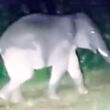Speaking during the zero hour in the Legislative Council, M.C. Nanaiah requested the Chief Minister B.S. Yeddyurappa, that permission be granted to shoot rogue elephants. The CM inhis reply said that shooting rogue elephants is not the solution to the problem, instead , they would be radio-collared and translocated.
Rogue elephants have become a menace to the rural populace and by radio-collaring, movement of elephants can be tracked and danger averted, the CM hoped.
Yeddyurappa said that the recent elephant census had shown that the State had the maximum number of elephants in the wild .
The CM also said that frequent attacks by elephants was a cause for worry. By radio-collaring these rogue elephants, they could be easily tracked and shifted, if necessary, to other interior parts of the forests. The CM also said other measures like digging of elephant trenches, erection of solar-powered electric fence will be put in place in various wildlife and reserve forests.
He said that water bodies would be constructed in all the forest areas so that water will be available for elephants through-out the year. Local teams have also been formed to chase elephants if they strayed near human habitations.
Karnataka Forest Department’s initiative to radio-collar rogue elephants involves implanting GSM-enabled microchips in 20 wild elephants over a span of two years, enabling officials to track their movements so that any incursions into human habitats and farmlands could be averted.
But several forest officers, whom we spoke to, said this was not an easy task and was time-consuming.
“The first problem is identifying rogue elephants. There are at least 5,000 tuskers in the State’s forests. Just one or two incursions by a tusker into rural human habitation or one single raiding of crops does not make him rogue,” said a Conservator of Forests from Nagarahole Forest Division.
The success of radio-collaring project, however, will depend on the response from its counterpart in Kerala.
The Bandipur Project Tiger National Park in Chamarajanagar district is contiguous with Mudumalai National Park in Tamil Nadu, which in turn is contiguous to Waynad Wildlife Sanctuary.




